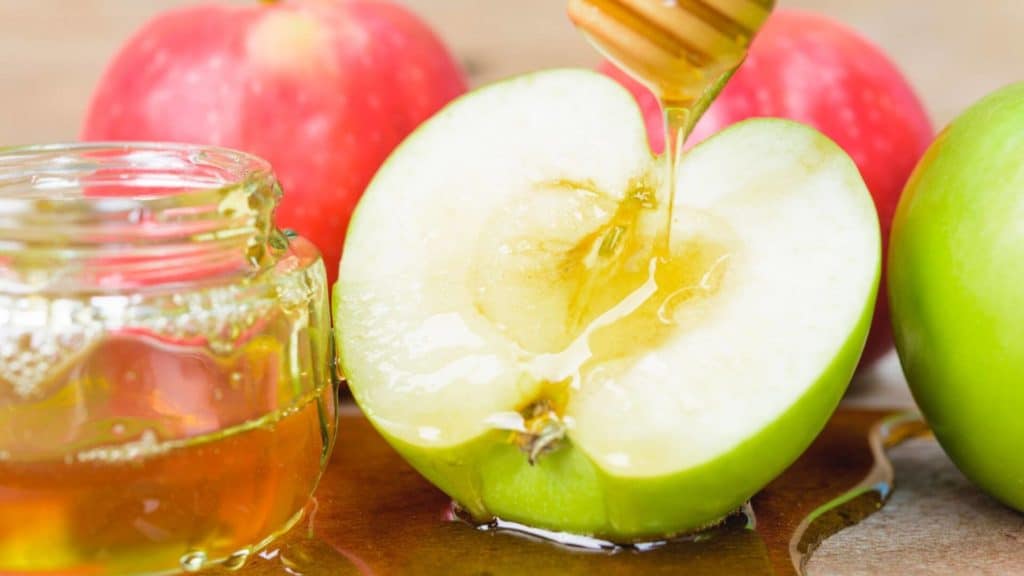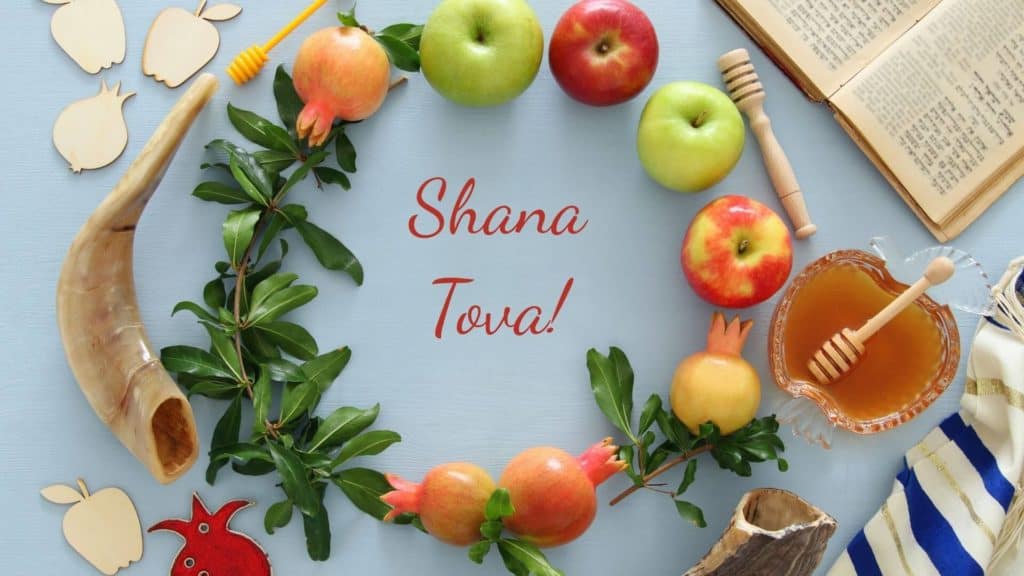This is How to Greet Someone Properly on Rosh Hashanah
There are a variety of ways to let someone know that you are thinking of them during Rosh Hashanah, the Jewish New Year, which begins on the first day of the month of Tishrei. You can wish them well in three different languages: English, Hebrew, or Yiddish; so let’s go over the various Rosh Hashanah greetings you could use to acknowledge the New Year!
In Judaism, the High Holidays refers to the two holidays in the Hebrew month of Tishrei (usually in September or October on the Gregorian calendar), the first being Rosh Hashanah followed by Yom Kippur ten days later. The days in between these two hugely important holidays in Judaism are called the 10 Days of Awe, where Jewish people repent for their sins of the past year and ask for forgiveness.
Read More: Learn Greetings for Yom Kippur in English, Hebrew, and Yiddish

The words Rosh Hashanah in Hebrew directly translate to Head of the Year in Hebrew. It’s not exactly Happy New Year, but it’s close. Rosh means head in Hebrew and Shanah is year. In Hebrew, when the letter HEY appears as a prefix to a word in Hebrew, it translates to “the,” so in this case, the “ha” at the beginning of Shanah translates to “the year.”
If you’re confused by the fact that sometimes Hashana(h) ends with an “h” and other times it does not and both Shana(h) and Tova(h) sometimes end with an “h” and other times do not, the truth is that anything goes. We are spelling these words phonetically, directly from Hebrew.
I also like to explain it another way. The name Hannah ends with a silent “h.” The Hebrew letter HEY is also silent at the end of the word – which is the letter that all three of these words end with – so you get to choose whether or not to include it in the spelling.
Rosh Hashanah Greetings in English
Happy New Year!
The most appropriate way to greet someone in English on Rosh Hashanah would be to say, “Happy New Year!” If you aren’t Jewish, it might feel strange to use that phrase in September or October and not January 1st, but I guarantee that your Jewish friends will feel the love. And just like we continue to say Happy New Year for the first three weeks of January or so, you can Happy New Year for a couple weeks after Rosh Hashanah ends.
Psst: Can you say Happy Rosh Hashanah?
It’s best to stick with Happy New Year but I guarantee the person you greet will appreciate the sincere wish regardless. Happy holidays (plural because of Rosh Hashanah and Yom Kippur) is a little better but still not quite as good of an option as Happy New Year.

Rosh Hashanah Greetings in Hebrew
Shana Tovah or L’shanah Tovah
לְשָׁנָה טוֹבָה or שָׁנָה טוֹבָה
TRANSLITERATION BMA STYLE: ShAH-nAH TOH-vAH OR LEH-shAH-nAH TOH-vAH
You’ll hear both of these phrases quite a lot surrounding the Rosh Hashanah holiday, so I wanted to explain the difference between the two.
Shana Tova translates directly to good year and is the best and most succinct way to greet someone in Hebrew on Rosh Hashanah.
L’shana Tova is the abbreviated version of the greeting below “l’shanah tovah tikateivu v’teichateimu.” I think that a lot of people don’t realize this and believe that adding the “L” to the beginning is more correct than Shana Tovah, but it’s not. L’shana Tova is not wrong, but it also isn’t more correct than simply saying Shana Tovah. Also, when the letter LAMED appears as a prefix to a word in Hebrew – in this case Shana – we translate to either “to” or “for.” In other words, to a good year!
Shana Tovah U’metukah
(May you have a good and sweet new year!)
שָׁנָה טוֹבָה וּמְתוּקָה
TRANSLITERATION BMA STYLE: ShAH-nAH TOH-vAH OO-mEH-tOO-kAH
This traditional Rosh Hashanah greeting proves you are “in the know” even if the person who you are saying this to has no idea what “u’metukah” actually means. They will most likely have heard it before in synagogue. We dip apples into honey to express our hope for a sweet and fruitful new year in a symbolic way, and this greeting is perfect to acknowledge that promise in a verbal way.
L’shanah tovah tikateivu v’teichateimu
(May you be inscribed and sealed for a good year!)
לְשָׁנָה טוֹבָה תִּכָּתֵבוּ וְתֵחָתֵמוּ
TRANSLITERATION BMA STYLE: LEH-shAH-nAH TOH-vAH TEE-kAH-tAY-vOO VEH-tAY-chAH-tAY-mOO
This particular greeting for Rosh Hashanah is ambitious, so you probably only want to use it if you are speaking to someone who is very religious or you are in a situation where you are wanting to show off your Hebraic knowledge. This is not a casual greeting and I think some Jews that don’t speak Hebrew would not even know what you were saying to them past the l’shanah tovah part.
That being said, this particular Rosh Hashanah greeting really embodies the spirit of the holiday. Not only is it the Jewish New Year, but it is the beginning of an important period of time where you must repent for your sins and ask for forgiveness so that you will be inscribed in the Book of Life for the upcoming year. And this particular greeting for Rosh Hashanah encompasses all of that.
Psst: Can you say Chag Sameach on Rosh Hashanah?
It’s complicated. Chag Sameach means Happy Holidays and to some extent has become a common way to greet one another on the many Jewish holidays throughout the year. Technically, however, Chag Sameach is meant to only be used on the three pilgrimage festivals: Passover, Shavuot, and Sukkot.

Rosh Hashanah Greeting in Yiddish
Gut Yontif
We can say this Yiddish greeting on Rosh Hashanah because it is a Yom Tov holiday. Yom Tov, which literally translates to good day but can also mean festival day, refers to the annual dates on the Jewish calendar in which the Torah prohibits work. Yom Tov lasts for the first two days of Rosh Hashanah, so you can say Gut Yontif on either of those two days.
Were these greetings for the Jewish New Year helpful to you? Learn Yom Kippur greetings and more on the BMA blog!
Sukkah Kits Review: Which is Best to Build a Sukkah?
The Perfect List of Sukkah Decorations Ideas for Sukkot
Use this Jewish Holidays Calendar for 2021-2030

